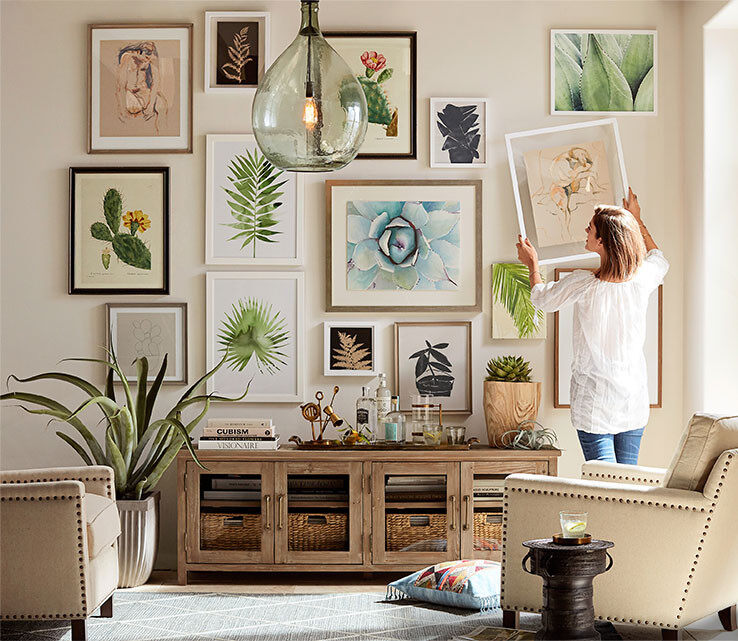Email format error
Email cannot be empty
Email already exists
6-20 characters(letters plus numbers only)
The password is inconsistent
Email format error
Email cannot be empty
Email does not exist
6-20 characters(letters plus numbers only)
The password is inconsistent


:max_bytes(150000):strip_icc()/TristanThompson_ENC9-3710c952b3d9475a9f426aed7c0277ba.jpg)
Wall art has the power to transform a room, adding personality, color, and visual interest to your home decor. Creating a gallery-worthy display may seem daunting, but with the right approach, you can curate a stunning arrangement that showcases your art collection and enhances the overall aesthetic of your space. In this blog post, we'll provide you with valuable tips and insights to help you master the art of wall art. Get ready to create a gallery-worthy display that will make a statement and captivate the eyes of your guests.
Plan the Layout: Before hanging your artwork, plan the layout by mapping it out on the floor or using paper cutouts. Consider the available wall space, the size and shape of your art pieces, and how they complement each other. Experiment with different arrangements until you find a layout that balances the overall composition. Remember to leave adequate spacing between the artworks to allow each piece to stand out and be appreciated individually.
Mix and Match: Don't limit yourself to a single type or style of art. Experiment with mixing and matching different mediums, sizes, and frames to create a visually captivating display. Combine paintings, prints, photographs, and even three-dimensional art pieces. By incorporating variety, you add depth and visual interest to your gallery-worthy display.
Consider the Theme: Consider a cohesive theme or concept to tie your artwork together. This could be a common color palette, a particular subject matter, or a specific style. A cohesive theme creates a harmonious and curated look, even if the individual art pieces are diverse. The theme can be subtle or explicit, depending on your personal preference and the overall aesthetic of your space.
Play with Scale: Experiment with different scales to create visual impact and balance within your gallery display. Combine larger statement pieces with smaller complementary ones to add variety and create focal points. Use the principle of proportion to guide your arrangement, ensuring that the overall composition feels balanced and visually pleasing.
Create a Visual Flow: Guide the viewer's eye through your gallery display by creating a visual flow. Consider the arrangement of the artworks and how they lead from one piece to another. This can be achieved by grouping similar pieces together or creating a path of visual interest through the arrangement. A well-planned visual flow adds cohesiveness and guides the viewer's experience.
Balance Colors and Textures: Take into account the colors and textures of your artwork when planning your display. Aim for a balanced distribution of colors and textures throughout the arrangement. Consider how different pieces interact with each other and the overall color scheme of the room. Introduce pops of color or texture strategically to create focal points and visual intrigue.
Utilize Frames and Matting: Frames and matting can significantly impact the overall aesthetic of your gallery display. Choose frames that complement the style and color palette of your artwork. Consider using matching frames for a cohesive look or mix different frame styles for added visual interest. Matting can provide breathing space and emphasize the artwork, so choose mat colors that enhance the pieces and the overall composition.
Create a Gallery Wall: If you have a larger collection of art pieces, consider creating a gallery wall. This involves covering a larger section of the wall with a collection of artworks arranged in an intentionally eclectic or organized manner. Experiment with various sizes, shapes, and orientations to create an eye-catching and dynamic display. A gallery wall can be a statement piece that becomes the focal point of the room.
Lighting and Placement: Consider the lighting in the room and how it enhances the display of your wall art. Natural light or strategically placed accent lights can draw attention to specific pieces or highlight the overall arrangement. Pay attention to the height at which you hang the artworks, ensuring they are at eye level or appropriately positioned for optimal viewing.
Mastering the art of wall art involves thoughtful planning, creativity, and a keen eye for design. By following these tips, you'll be well-equipped to curate a gallery-worthy display that showcases your art collection and adds visual intrigue to your space. Remember to plan the layout, mix and match art pieces, consider a cohesive theme, play with scale and visual flow, balance colors and textures, utilize frames and matting, create a gallery wall if desired, and pay attention to lighting and placement. With these insights, you can create a captivating and personalized gallery display that elevates the aesthetic of your home and showcases your unique style and artistic taste.